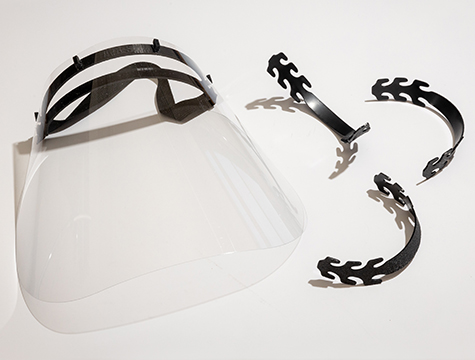Iowa State’s people are known for their innovative, collaborative spirit and willingness to help wherever they are needed. And at the onset of the COVID-19 pandemic last spring, that need was never greater. Faculty, students and other collaborators from diverse disciplines tackled the challenges people were facing – from what is in front of them now to what lies beyond the horizon – applying their expertise, creativity and entrepreneurial thinking in new ways.
Crisis innovation
As the shared fight against COVID-19 got underway, Iowa State’s Veterinary Diagnostic Laboratory stepped up first, joining forces with the State Hygienic Laboratory at the University of Iowa in a collaboration that ramped up the testing capacity of Iowa’s public health and environmental lab.
After the call went out from healthcare facilities for more personal protective equipment, the response came from nearly every corner of campus: sewing hundreds of face masks, fabricating plexiglass divider shields, and designing and manufacturing face shields … more than 8,000 of them.
“We’re working to keep healthcare workers covered – literally – and healthy,” said Caroline Hayes, chair of the mechanical engineering department and Lynn Gleason Professor in Interdisciplinary Engineering.
Pivot to making medium-term impact
The process of testing, isolating and tracing has been used in public health for decades to contain disease outbreaks in populations. Successfully staying ahead of a global pandemic, however, lies in rapidly scaling up both diagnostic testing and comprehensive contact tracing.
Early on, Professor of Psychology Christian Meissner brought his expertise in memory and recall to developing CogTracer, a do-it-yourself tool that uses the science of memory to help people recall and retrace their interactions, contacts and activities during the coronavirus contact tracing process.
On the testing side, Assistant Professor of Chemistry and Suresh Faculty Fellow Robbyn Anand and her students are developing a quick-response paper test strip using saliva to detect the coronavirus that causes COVID-19. The protein-detection technology the test is based on “is a little like a dam,” Anand explained. “As fluid flows through the paper strip, the electric field backs up charged molecules – including proteins – so the test line on the paper is exposed to a higher concentration of them for a longer time. Both help with the sensitivity of the test.”

— Caroline Hayes, chair of the mechanical engineering department and Lynn Gleason Professor in Interdisciplinary Engineering
Looking beyond the horizon
As researchers around the globe raced to find prevention and treatment options for COVID-19, investigators at the Iowa State-headquartered Nanovaccine Institute have been building on the work they’ve conducted over a decade not only to aid these efforts, but also with an eye on the next pandemic. The biodegradable nanoparticles they’re developing can deliver medications and vaccines precisely where they are needed in the body needle-free and with a long shelf life and room-temperature stability – properties that are critical for containing COVID-19 and its variants worldwide, as well as curing the innumerable diseases plaguing billions of people globally.
Associate Professor of Rural Sociology David J. Peters and other researchers are documenting the health, socioeconomic and emotional impacts of COVID-19 in Iowa’s rural communities to improve how communities prepare and respond to such stresses in the future, while researchers with the Center for Agricultural and Rural Development and the department of economics are similarly examining the pandemic’s impacts related to agriculture on local, regional and global economies.
“It’s a good start to an important project,” said Department of Economics Chair Joshua Rosenbloom. “It offers resources that can help producers, businesses and policymakers make informed decisions now and plan for the future during this unprecedented time in our history.”







